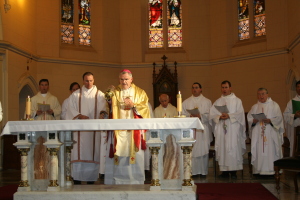The word Mass is from the Latin word Missa, meaning “sending forth”. And if we consider Mass in these terms it takes on a dimension that so many of us are perhaps ignorant of, or like to forget sometimes.
Mass is all about communion. We are a communion of persons who unite their prayers together and receive Christ in the Eucharist. We thank God, remember Christ and delight in His presence. But Mass is not just an event that finishes when the final hymn ceases, Mass is a preparation for mission. Consider the final words of the priest at the conclusion of Mass: ‘Go in peace, to love and serve the Lord.’ The priest is not telling us, okay, you’ve fulfilled your obligation this week, see you all next Sunday.
He is sending us forth, urging us to go and love God and serve him in any way we can. Of course the way in which we serve God differs in so far as the individual lives and vocations we have, yet we are all called to serve Him in our own way.
When you think about it this way, Mass is directed towards action, others and mission. In receiving and consuming Christ in the Eucharist we should become more like Him. And to be more like Jesus is to live according to his word and to lead a radical Christian life in an increasingly secular world.
When we are Baptised into the Church, we become: ‘“living stones” to be “built into a spiritual house, to be a holy priesthood.” By Baptism they share in the priesthood of Christ, in his prophetic and royal mission. They are “a chosen race, a royal priesthood, a holy nation, God’s own people, that [they] may declare the wonderful deeds of him who called [them] out of darkness into his marvellous light.” Baptism gives a share in the common priesthood of all believers.’ (CCC 1268)
At our Baptism we asked for faith and with that came the responsibility of joining in the mission and life of the Church. Part of the life of the Catholic Church is attendance at Mass and the reception of Communion (providing all of the conditions are met) at least once a year.
The Eucharist unites us to Christ and in doing so we are closer to Him. Further to this, as members of the same Church the Eucharist draws us all closer together and unites us in our common faith and mission. Receiving the Eucharist ‘preserves, increases and renews the life of grace given to us at Baptism’ and separates us from sin. ‘As bodily nourishment restores lost strength, so the Eucharist strengthens our charity, which tends to be weakened in daily life; and this living charity wipes away venial sins.’ (1394) ‘By the same charity that it enkindles in us, the Eucharist preserves us from future mortal sins . The more we share the life of Christ and progress in his friendship, the more difficult it is to break away from him by mortal sin.’ (CCC 1395)
Basically this means, that the more we receive Holy Communion, the more we each grow in charity and holiness for as our charity grows our sins are wiped away, and even the inclination we have to commit any sins is diminished.
The Eucharist also commits us to the poor. And this does not just mean the economically poor but there are many people who are spiritually or morally poor and we are committed, by our Baptism and by our attendance at Mass, to help them in whichever way we can. So then, Mass equips us spiritually to live out the Christian journey that we started at our Baptism.
Mass strengthens our charity and unites us as the Body of Christ. A weekly renewal of our faith and nourishment for the spiritual journey we are on. The best analogy I have heard for this aspect of Mass is that it is an ecclesiastical pit stop for the Body of Christ. We stop to refuel, recharge and retread as we prepare to set off again, driving headlong into the mission we as Catholics all share.
Next time you attend Mass consider, with more than a passing glance, what those final words of Mass mean for you in your life. ‘Go in peace to love and serve the Lord.’
Originally posted 2015-01-01 22:06:29.

